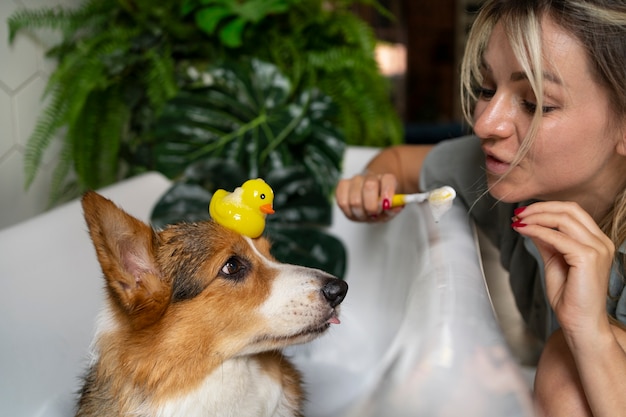Fall Pet Health Checklist: Preparing for Chatham’s Changing Weather


Fall Pet Health Checklist: Preparing for Chatham’s Changing Weather
As the vibrant colors of autumn arrive in Chatham and the air turns crisp, both you and your pets feel the changes that come with the new season. While fall brings scenic walks and cozy nights, it also introduces new health considerations for dogs and cats. At Symbios Animal Health, our veterinary team in Chatham, NJ is here to help you navigate seasonal transitions with a comprehensive fall pet health checklist. Whether you are concerned about your pet’s comfort as temperatures drop or want to prevent seasonal illnesses, this guide will walk you through essential steps for autumn pet care. With our focus on preventive programs and ongoing wellness, you can look forward to a safe and healthy season for your furry companion.
In this blog, we will cover how to recognize seasonal health concerns in your pet, why these issues arise during fall, what management strategies work best, and how to prevent common problems. As your trusted local resource for pet wellness care in Chatham, we invite you to schedule an appointment with our veterinary professionals for personalized advice and care tailored to your pet’s needs. Let’s explore practical seasonal pet care tips to keep your dog or cat happy and healthy as routines shift with autumn’s arrival.
Recognizing Seasonal Pet Health Concerns in Chatham
Autumn’s arrival in Chatham brings cooler mornings, damp leaves, and shorter days, all of which can trigger changes in your pet’s behavior and health. Recognizing the subtle signs that your pet may be affected by the season is the first step in effective fall pet health management. Common indicators include changes in energy levels, appetite shifts, and increased shedding or dry skin as indoor heating becomes more prevalent. You may also observe sneezing or coughing due to fluctuating indoor and outdoor air quality. For some pets, joint stiffness becomes more noticeable as temperatures drop, making it harder for them to enjoy walks or playtime.
Other warning signs that may suggest your pet needs attention are a dull or brittle coat, licking or scratching at paws exposed to wet leaves, or signs of anxiety as family routines change with the return to school or work. If you notice any of these changes, it is important to consider how the seasonal environment might be playing a role. Your veterinary team is skilled at distinguishing between typical seasonal adjustments and potential health issues that require intervention.
Why Do Fall Health Issues Occur in Pets?
As the weather cools and daylight hours decrease, several factors can influence your pet’s health. In Chatham and surrounding communities, dampness and decaying leaves can harbor mold, fungi, and bacteria, increasing the risk of respiratory issues or infections if your pet spends time outdoors. Fleas and ticks remain active well into the fall, especially in wooded or grassy areas, so the threat from parasites does not disappear after summer.
Indoor heating, while essential for comfort, can dry out your pet’s skin and coat. Additionally, as daylight shortens, pets may become less active, leading to weight gain or boredom-related behaviors. Joint discomfort can become pronounced in older animals or breeds prone to arthritis when temperatures drop and humidity rises. Seasonal celebrations like Halloween and Thanksgiving often bring new foods and decorations into your home; ingestion of certain items can pose risks for gastrointestinal upset or toxicity.
Understanding these background factors helps you and your veterinarian create a proactive plan for fall pet health. By anticipating common challenges, you can adapt your pet’s care to the unique conditions of autumn in the Chatham area.
Professional Fall Pet Health Management Strategies
A thorough fall pet health checklist begins with a veterinary wellness examination. At Symbios Animal Health, our veterinarians recommend regular checkups to identify and address seasonal health issues before they become more serious. During a fall wellness visit, your veterinary professional will assess your pet’s coat quality, skin condition, weight, joint mobility, and overall health. They may recommend routine bloodwork or diagnostic screenings for senior pets or those with chronic conditions. Fall is also an ideal time to update vaccination services to guard against seasonal illnesses such as canine influenza or upper respiratory infections, which can be more prevalent as pets spend time indoors or in group settings.
Preventive care in Chatham includes ongoing parasite protection; your veterinarian may suggest continuing flea, tick, and heartworm prevention throughout the fall, as pests remain a threat until the first hard frost. If your pet’s coat is showing signs of dryness, professional guidance on grooming and omega-3 supplementation can help restore luster and comfort. For pets showing signs of joint discomfort, the veterinary team may recommend weight management, joint supplements, or specific exercise regimens tailored to the cooler weather.
Additionally, if your family’s schedule is changing with the season, our team can help you plan for your pet’s mental wellbeing by suggesting enrichment activities or recommending boarding and day care services for days when your pet may be home alone for extended periods. By partnering with a veterinarian near me, you can ensure your pet’s health remains a priority all year long.
Home Care and Preventive Steps for Seasonal Pet Health
Supporting your pet at home during the fall involves a combination of attentive observation and practical adjustments. Regularly brush your pet’s coat to remove loose fur and stimulate healthy skin, especially if you notice increased shedding as heating systems kick in. After outdoor walks, wipe your pet’s paws to remove moisture, dirt, and potential allergens like mold spores or leaf debris. Monitor your pet’s weight and activity levels; if shorter days mean fewer walks, try engaging your dog or cat in indoor play to maintain muscle tone and mental stimulation.
Adjust your pet’s bedding to ensure warmth and comfort during cooler nights, and consider placing beds away from drafty doors or windows. For pets prone to joint stiffness, provide padded bedding and gentle, consistent exercise appropriate to their age and health status. Be vigilant about seasonal hazards at home, including holiday foods, decorations, and toxic plants like certain chrysanthemums or autumn bulbs. Keep chocolate, grapes, raisins, and sugar-free gum well out of reach, as ingestion can be dangerous for both dogs and cats.
For ongoing preventive care, schedule routine wellness examinations and stay current on vaccinations and parasite protection. If you are traveling or your routine is changing, plan ahead for your pet’s care with trusted boarding or pet sitting arrangements. Implementing these seasonal pet care tips can help your pet thrive through autumn’s unique challenges.
When Should You Seek Veterinary Care During Fall?
While many fall-related pet health issues can be managed at home, certain signs warrant prompt attention from your veterinary team. Seek veterinary care if your pet experiences persistent coughing, sneezing, or nasal discharge, which may indicate respiratory infection. Sudden changes in appetite, vomiting, diarrhea, or lethargy are also causes for concern, particularly if your pet may have ingested something harmful. Limping, reluctance to move, or noticeable joint swelling should be evaluated to rule out injury or worsening arthritis. Skin irritation, hair loss, or signs of flea infestation require professional assessment and targeted treatment.
If you are unsure whether your pet’s symptoms are serious, err on the side of caution and contact your veterinarian for advice. Our veterinary professionals at Symbios Animal Health are committed to providing comprehensive pet care in Chatham and supporting you with clear guidance whenever health concerns arise. Remember, timely intervention is key to preventing minor seasonal issues from becoming major health problems.
Conclusion: Schedule Your Fall Pet Wellness Visit in Chatham
As autumn settles into Chatham and surrounding communities, preparing your pet for the season’s changes is a gift that supports their long-term health and happiness. By following a thorough fall pet health checklist and staying attentive to shifts in your pet’s behavior, coat, or mobility, you can address issues early and avoid seasonal setbacks. Our compassionate veterinary team at Symbios Animal Health is here to help you navigate every stage of your pet’s care journey, from preventive checkups to tailored advice for fall-specific challenges.
If you are searching for a vet near me who offers quality, relationship-based care, we invite you to experience our signature membership programs and comprehensive wellness services. Schedule your pet’s fall wellness examination or discuss vaccination services by calling (973) 834-9008 or visiting us at 588 Main Street, Chatham, NJ 07928. For additional seasonal pet care tips or to learn more about our approach to preventive wellness care in Chatham, our veterinarians are here to answer your questions and support your pet’s health this fall and beyond.
Disclaimer: This article is intended for general informational purposes only and should not be considered a substitute for professional veterinary advice. If your pet is experiencing symptoms or you have specific concerns, consult your veterinarian for individualized recommendations.
For further reading about seasonal pet health, visit the American Veterinary Medical Association’s pet care resources or explore more on our website at symbios.vet.



















